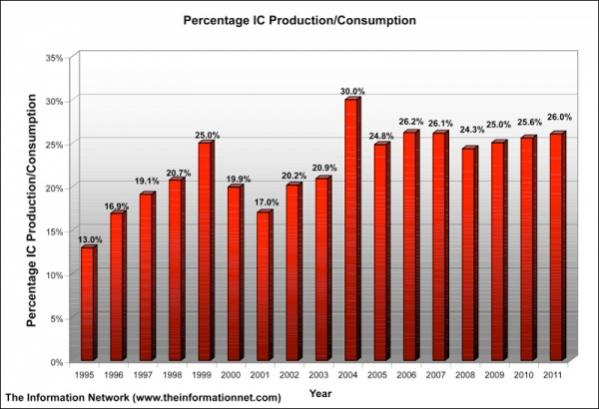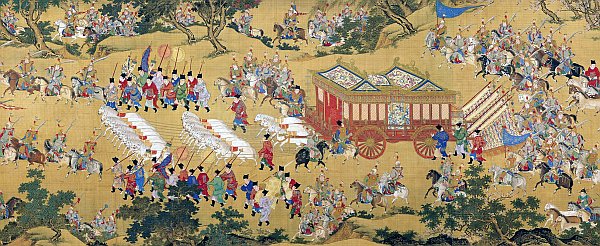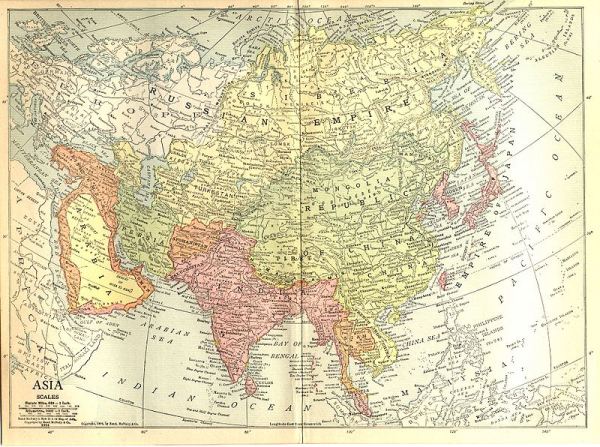TSMC Versus Global Foundries and TSMC versus SMIC clearly indicate that TSMC is the number one foundry in the world and it will be that way for the foreseeable future. The question now is who will be number two? Who will seriously challenge TSMC?
UMC has 10 fabs, 8 in Taiwan, 1 in Japan, and 1 in Singapore. Global Foundries will have Chartered’s 6 fabs in Singapore, AMD’s fab in Dresden with 1 more fab under construction in Dresden and another under construction in upstate New York, so 9 fabs in total. UMC just made a key fab acquisition in China (He Jian Technology Co. Ltd.) which has an interesting story to it.

The Chinese semiconductor total addressable market (TAM) is a staggering 1.33B+ people with a median age of 34 years. Fueled by the internet, consumerism is running rampant in China, Western culture is flooding in, allowing the Chinese people to make technology leaps and bounds like no others. Unfortunately, the Chinese government funded semiconductor manufacturing initiatives are struggling due to some serious miscalculations: underestimating the cost and experience required to be successful, underestimating the demand curve of the Chinese consumer, underestimating rapid technological advances, and what it takes to be a competitive semiconductor manufacturer.

Fortunately the political tensions between Taiwan and China are easing, so technology has begun to flow freely between the two countries. The Political Status of Taiwan Wikipedia page is very detailed in case you are interested. If not, here it is in a nutshell, recent Taiwan elections tossed out the DPP (Democratic Progressive Party) and brought in a pro China political party KMT (Chinese Nationalist Party). Also tossed out are the strict Taiwanese laws designed to prevent flight of technology to mainland China, which the DPP controlled Taiwan viewed as a potential military enemy.
This brings us to the UMC acquisition of the Chinese foundry He Jian Technology Co. Ltd. UMC paid $285m for the 85% it did not already own, which had full new KMT Taiwan government approval. Unfortunately the previous 15% UMC purchased did NOT have DPP Taiwan government approval which resulted in the resignation of UMC executives. On January 9[SUP]th[/SUP] 2006, just hours before being indicted in Taiwan for allegedly making illegal investments in He Jian, UMC chairman Robert Tsao and vice chairman John Hsuan resigned their posts. If convicted, the executives may face jail time of between six months and five years, which is highly unlikely under the new Taiwan KMT government.

TSMC already has manufacturing in China, UMC now has manufacturing in China. TSMC and UMC are both process independent, meaning that they own all of their process technologies outright. SMIC is the largest foundry in China but does not own the process technologies, earlier versions were derivatives of TSMC processes, newer versions will be licensed from IBM. Global Foundries and Chartered Semiconductor do not have China based manufacturing (yet) and also license newer process technologies from IBM.
If you believe, like I do, that manufacturing process technology differentiation is key to semiconductor foundry success. If you believe, as most people do, that the emerging Chinese consumer electronics market is key to semiconductor industry growth, UMC will continue to be a strong #2 contender. Otherwise competitive pricing will rule, generic semiconductor manufacturing processes will dominate, and the foundry consolidation cycle will repeat itself indefinitely.
Share this post via:






Semidynamics Unveils 3nm AI Inference Silicon and Full-Stack Systems